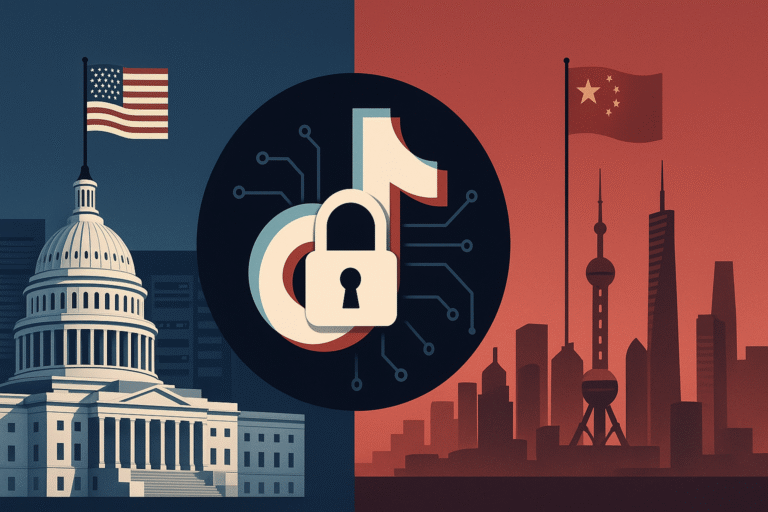Table of Contents
Washington D.C. – September 15, 2025 – The White House has announced its approval of a “conceptual agreement” or “framework” designed to restructure the ownership of TikTok’s US operations, a move that would stave off an imminent ban of the popular video-sharing app. The complex deal involves US tech giant Oracle and retail behemoth Walmart, and aims to address the national security concerns that have been at the heart of a months-long political and corporate saga.
While the deal has received a preliminary nod from the US administration, it marks not an end, but a critical new phase, as final approvals are still required from both Washington and Beijing.
The Core of the Deal: Introducing “TikTok Global”
The proposed solution does not involve an outright sale as was initially demanded. Instead, it would create a new US-based company, tentatively named TikTok Global. Here is a breakdown of the proposed framework:
- New Company Structure: TikTok Global would be a new entity, headquartered in the United States, and would be responsible for serving TikTok users in the US and most of the world outside of China.
- Ownership Stakes:
- US companies Oracle and Walmart would collectively acquire a 20% stake in the new TikTok Global.
- TikTok’s Chinese parent company, ByteDance, would retain the remaining 80% stake. However, proponents of the deal argue that because US investors own a significant portion of ByteDance itself, the overall American ownership of TikTok Global would effectively be over 50%.
- Oracle as ‘Trusted Technology Partner’: Oracle’s role is central to addressing the US government’s data security concerns.
- Data Hosting: All US user data would be migrated to and stored on Oracle’s secure cloud infrastructure within the United States.
- Code Review: Oracle would have the right to inspect and review TikTok’s source code and algorithm to ensure there are no “backdoors” that could be exploited by the Chinese government for espionage or data theft.
- Walmart’s E-commerce Integration: Walmart would lead the commercial aspects of the deal, aiming to integrate its e-commerce, fulfillment, and payment capabilities into the app, creating a new social commerce powerhouse.
| Key Player | Role in the Deal | Strategic Interest |
|---|---|---|
| ByteDance | Retains majority ownership (80%) of the new TikTok Global entity. | Avoids a forced full sale and a ban, preserving its most valuable international asset. |
| Oracle | Becomes the “trusted technology partner,” hosting US data on its cloud and auditing the app’s code. Takes a 12.5% stake. | Secures a massive cloud computing client and gains a strategic foothold in a top social media platform. |
| Walmart | Becomes the primary commercial and e-commerce partner. Takes a 7.5% stake. | Gains direct access to a young, engaged user base of over 100 million Americans, boosting its e-commerce and advertising business. |
A Deal on a Knife’s Edge: Approvals Needed
Despite the positive announcement from the White House, the deal’s finalization is far from certain and faces significant hurdles on two fronts.
1. Washington’s Final Green Light
The Committee on Foreign Investment in the United States (CFIUS), the body responsible for reviewing national security implications of foreign investments, must give its final, formal approval. While the President’s conceptual blessing is a major step, the specifics of data security, board composition (which is expected to have a majority of American directors), and governance of TikTok Global will be heavily scrutinized.
2. Beijing’s Algorithm Hurdle
Perhaps the biggest obstacle lies with the Chinese government. Recently, Beijing updated its export control laws to include technologies like “personalized information recommendation services based on data analysis”—a direct reference to the powerful algorithms that form TikTok’s “secret sauce.”
ByteDance has publicly stated that the deal will not involve a transfer of its core algorithms. This creates a major point of contention: How can Oracle serve as a “trusted technology partner” and verify the code’s security without full access to the recommendation engine that powers the app? Resolving this conflict between the US demand for security oversight and China’s restriction on technology exports is the most delicate part of the ongoing negotiations.
Broader Implications: The “Tech Cold War”
This unique and convoluted deal framework is a landmark event in the escalating “Tech Cold War” between the US and China. It could set a powerful precedent for how global technology companies must navigate geopolitical fault lines.
The creation of TikTok Global signals a potential move towards a “splinternet,” where a single global service is forced to operate under different rules, data governance models, and even corporate structures depending on the country. This model of “corporate domestication” could become a template for other cross-border tech platforms in the future, fundamentally reshaping the nature of the global internet.
For now, the fate of the app used by over 100 million Americans hangs in the balance, contingent on the final approvals from two world powers, each determined to protect its own national and economic interests.

